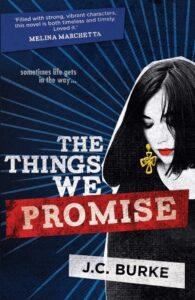
-
We were delighted to have the opportunity to put some questions to J C Burke, regarding her new novel, The Things We Promise published by Allen & Unwin. Due out next week, the story deals with 16 year old Gemma, who learns that her beloved brother Billy is diagnosed with AIDs. It is set in the 1990s amid misinformation and hysteria that swept the world around this crisis.
Gemma is an extraordinary narrator, even though she is (beautifully) depicted as ordinary and real. What important aspects of her character were you determined to present?
Gemma’s voice came so naturally to me. She really took the lead and I was merely the scribe. I was determined to show her growth- what she considered important at the start of the novel was vastly different by the end. I think that’s typically what challenges and trauma can do to a person and if you deal with it, you come out as a stronger person. I wanted to show that (obviously in a subtle way). She needed to be headstrong but vulnerable; confident yet uncertain of so many things at the same time. I suppose ultimately I wanted to draw as true a picture as possible, of a 16 year old girl, bowled over by the unexpected.
Tell us about your research for the nineties. Did that take a lot of time, or could you remember some of it? Was there something in particular you had fun including in your storylines?
Every teacher in every staff room of every school I visited, were interrogated on their memories of the 90’s and AIDs. Fashion provided many laughs! And the hairstyles! I had my own memories and it was interesting to compare them to those of others. The different ages they were; whether they lived in the city or country etc. I really had quite a collection by the time I started writing. What became evident was the differing response to HIV/AIDs in rural Australia. Plus I watched old tv shows, commercials, magazines. I went to the State Library of NSW and scrolled through the newspapers.
You have managed to write a book about the waste of young lives due to apathy and ignorance without being too morbid or depressing. How important is it to you to try to keep young people’s hopes alive?
I wanted to capture a specific time in our recent history. Terrible things happened, discrimination was rife, fear was tangible, ignorance governed BUT on the flip side there were brave and good people who fought tirelessly against all those things. They are the true heroes of this time and I think it’s important for young adults to know about their history and these stories. Inspire them to see how challenges can be faced.
There is a lot going on in Gemma’s life apart from Billy’s circumstances. Why did you bring in all these threads?
Because life and all its trivialities don’t stop for disease or death. I wanted the story to be as real as possible.
We haven’t really asked about Billy. What would you like readers to know about him?
It was important Billy was flawed. Just because you’re dying doesn’t mean you become some perfect person! AIDS/HIV swept through USA- especially New York, San Francisco, Philadelphia (to name a few). Billy being based in NYC gave the opportunity to touch on this history.
How would you like booksellers, librarians and parents to sell/present this book to young people?
As a piece of recent history. Worldwide as well as at home. Something very real and very traumatic happened to ordinary people, the majority of them healthy young men. I think now for young adults, AIDS/ HIV is often thought about in the context of Africa and other developing nations. Also to see the story in the context of how far we’ve come as a nation and how different suburban life was. The harm that ignorance and small minds reap compared to what knowledge, action and understanding can achieve. I hope the story is considered to be uplifting even though it’s sad in parts.
It is definitely both uplifting and sad. Our review of The Things We Promise will be uploaded soon. Thank you to J C Burke for your time, and to Allen & Unwin for their assistance.
- Read a blog post by J C Burke about being a nurse during the time of AIDs
- Read Katie Mineeff’s review of The Things We Promise

